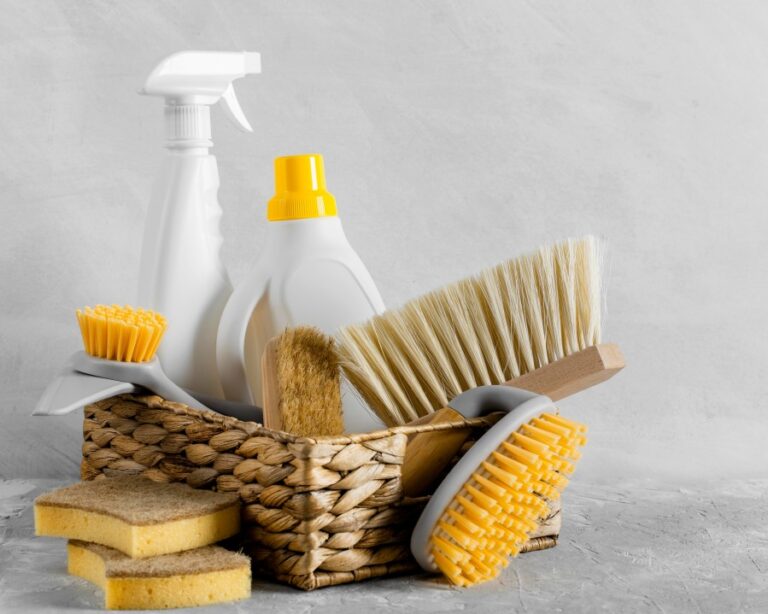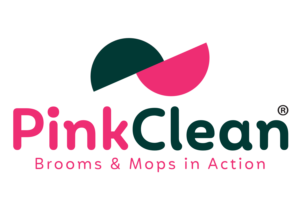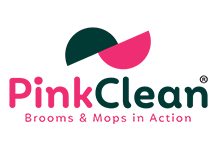What are the Four Main Types of Cleaning Agents Used in Commercial Kitchens?

Commercial kitchens are bustling environments where commercial cleaning is paramount to ensure food safety and maintain hygiene standards. To uphold these standards, various types of cleaning agents are employed to tackle different kinds of dirt, grease, and bacteria. In this article, we’ll delve into the four main types of cleaning agents commonly used in commercial kitchens and their significance in maintaining a clean and safe environment for food preparation.
Degreasers
Degreasers play a crucial role in commercial kitchen cleaning by effectively removing grease, oil, and grime from surfaces such as countertops, stovetops, and kitchen equipment. These agents are formulated to break down tough grease buildup, making cleaning tasks more manageable for kitchen staff.
There are various types of degreasers available, including solvent-based and water-based formulations. Solvent-based degreasers are effective for heavy-duty cleaning tasks, while water-based degreasers are safer for use in food preparation areas. When using degreasers, it’s essential to follow manufacturer instructions and ensure proper ventilation to prevent inhalation of fumes.
Detergents
Detergents are another essential cleaning agent used in commercial kitchens to remove food residues, stains, and grease from dishes, utensils, and surfaces. Unlike degreasers, detergents are formulated to emulsify grease and suspend soils, allowing for easy rinsing and cleaning.
Commercial kitchens utilize various types of detergents, including hand dishwashing detergents, machine dishwashing detergents, and multi-surface cleaners. It’s crucial to select the appropriate detergent based on the cleaning task and surface to be cleaned. Additionally, proper dilution and application methods should be followed to ensure effective cleaning and prevent residue buildup.
Disinfectants
Disinfectants are vital for maintaining a sanitary environment in commercial kitchens by eliminating harmful bacteria, viruses, and other pathogens that can contaminate food and surfaces. These agents help prevent the spread of foodborne illnesses and ensure compliance with health and safety regulations.
Common types of disinfectants used in commercial kitchens include quaternary ammonium compounds, chlorine-based sanitizers, and hydrogen peroxide-based cleaners. It’s essential to use disinfectants according to label instructions, including proper dilution ratios and contact times, to achieve optimal disinfection results.
Sanitizers
Sanitizers play a crucial role in reducing microbial contamination on food contact surfaces, utensils, and equipment in commercial kitchens. Unlike disinfectants, which kill a broader range of microorganisms, sanitizers reduce the number of bacteria to safe levels as determined by public health standards.
There are different types of sanitizers available, including chlorine-based sanitizers, iodine-based sanitizers, and quaternary ammonium sanitizers. Proper sanitizing procedures, including surface preparation and contact time, are essential for effective microbial reduction and food safety.
Importance of Using the Right Cleaning Agent
Using the right cleaning agent is essential for maintaining cleanliness, preventing cross-contamination, and ensuring food safety in commercial kitchens. Improper use of cleaning agents can lead to residue buildup, ineffective cleaning, and potential health hazards for consumers.
By understanding the properties and proper usage of different cleaning agents, kitchen staff can effectively remove dirt, grease, and bacteria from surfaces and equipment, minimizing the risk of foodborne illness outbreaks and regulatory violations.
Best Practices for Using Cleaning Agents
To ensure safe and effective cleaning in commercial kitchens, it’s essential to follow best practices when using cleaning agents:
- Always read and follow manufacturer instructions for proper dilution, application, and safety precautions.
- Wear appropriate personal protective equipment, including gloves and eye protection, when handling cleaning agents.
- Ensure proper ventilation in enclosed areas to prevent inhalation of fumes and chemical exposure.
- Regularly inspect and maintain cleaning equipment to ensure proper functionality and performance.
- Provide training and education to kitchen staff on the safe handling and use of cleaning agents to prevent accidents and injuries.
Conclusion
In conclusion, maintaining cleanliness and hygiene in commercial kitchens is essential for ensuring food safety and preventing foodborne illnesses. By utilizing the four main types of cleaning agents—degreasers, detergents, disinfectants, and sanitizers—kitchen staff can effectively remove dirt, grease, and bacteria from surfaces and equipment, creating a safe environment for food preparation and service.
Implementing proper cleaning protocols, following best practices, and staying informed about the latest industry standards are critical for upholding cleanliness standards and protecting public health in commercial kitchens.
Pinkclean is a deep cleaning company in Bangalore. It specializes in Deep cleaning, commercial cleaning, and office cleaning. Book now for a free quote!

